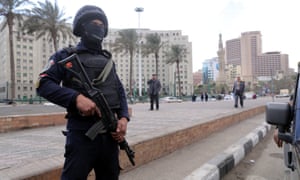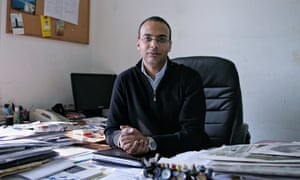Jack Shenker

Link
The scale of state repression in Egypt is greater today than it has been for generations, one of the country’s most prominent journalists and human rights advocates has told the Guardian.
Hossam Bahgat, an investigative reporter who was recently detained by Egypt’s military intelligence agency, spoke out ahead of the fifth anniversary of the start of Egypt’s revolution on Monday – the run-up to which has seen an unprecedented crackdown by security forces against opposition and dissent.
“This is without doubt the worst we’ve ever seen,” said Bahgat, citing restrictions on media outlets, a spike in the number of political prisoners, forced disappearances, and alleged extrajudicial killings of Islamists by the state.
“The level of repression now is significantly higher than it was under the Mubarak regime, and people from older generations say it is worse than even the worst periods of the 1950s and 1960s [under the rule of Gamal Abdel Nasser].”
In an effort to ward off any protests half a decade on from the uprising thattoppled the former president Hosni Mubarak, the Egyptian authorities haveraided thousands of homes in Cairo and installed new surveillance infrastructure around Tahrir Square.
Preachers have reportedly been instructed by the state to give sermons declaring it a sin to demonstrate against the government, while cafes, cultural institutions and book publishers have all been investigated by security agencies.
Under the country’s protest law, implemented by executive decree soon after the military overthrow of the former Muslim Brotherhood president, Mohamed Morsi, in 2013, participation in any unsanctioned marches or rallies is unlawful.
The Egyptian government says it is fighting terrorism and claims the country is making progress on political rights. Over the past week five Egyptian policemen were killed by gunmen in northern Sinai, while six people died in a bomb attack in Giza.
“We have paid a lot for the security and stability that we currently live in, so I ask all Egyptians for the sake of the martyrs and the blood to take care of their country,” Abdel Fatah al-Sisi, the president, said in a speech to the nation on Saturday.
Bahgat argued: “The only reason that there is such a level of panic regarding public opinion is that two years ago the regime could afford to take us for granted; Sisi was worshipped and they had carte blanche to do whatever it took to impose stability.
“With all the state powers now unified under Sisi’s leadership ... people are now starting to ask questions of him.”
Bahgat is the founder of the Egyptian Initiative for Personal Rights, one of Egypt’s most acclaimed human rights organisations. Since 2014 he has worked as a journalist with Mada Masr, an independent media outlet known for covering news stories that other parts of the Egyptian press shy away from.
In November last year, the 36-year-old was detained by military authorities following a story he wrote for Mada Masr entitled A Coup Busted?, which detailed the military trial of several army officers found guilty of attempting to topple the president.
Bahgat was told he faced charges of “deliberately broadcasting false news that harms national interests”, but following an international outcry – including planned demonstrations in London and New York and an intervention by the UN secretary general, Ban Ki-moon – he was released after two days. It is unclear whether military prosecutors are still preparing a case against him.
“It was a reflection of how the state and security agencies view journalism today,” said Bahgat of his arrest. “What Mada Masr tries to do is not only survive in this very difficult atmosphere but to survive while respecting its mission to report the news and provide a historical record of this particular stage in our country’s history. ”
Egypt under Sisi has jailed more journalists than any other country on earth bar China. In the past month alone, three more reporters have been imprisoned, one forcibly disappeared and later charged with membership of a banned organisation, and six others referred to judicial hearings on account of their work.
In Bahgat’s view, the leadership is nervous because of its failure to live up to its own rhetoric. “Two years ago this regime thought it was invincible,” he said. “Right now we’re in a position where clear cracks are starting to appear within the ruling circles, and there’s a level of criticism of government conduct and corruption that simply did not exist before.
“This is a regime that people supported even at the expense of their own rights in order to defeat terrorism, and yet terrorism attacks today are at an all-time high and we have seen the almost complete destruction of the tourism sector. People are starting to realise that they gave up their liberties but did not get either the safety or economic stability they were promised in return.”


No comments:
Post a Comment